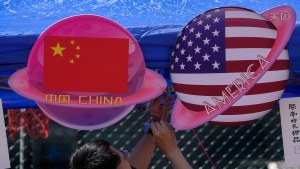Are economic ties to China a strength or weakness for Illinois? Rep. Raja Krishnamoorthi weighs in.

In a Q&A, Rep. Krishnamoorthi talks about Illinois’ trade relationship with China and how local businesses should navigate strained U.S.-China ties — and even help shape them.
Even as China’s economy flags, China remains one of Illinois’ largest trade partners: Last year, the state exported $4 billion to China and imported $43 billion, making China the state’s second-largest import market and fourth-largest export market. Since 2019, Illinois-China imports and exports have both grown.
First elected to represent Chicago’s northwest suburbs in 2016, Rep. Raja Krishnamoorthi, D-Ill., has emerged as one of Capitol Hill’s leading policymakers on China. He serves as Ranking Member of the House Select Committee on Strategic Competition Between the United States and the Chinese Communist Party, and he co-sponsored H.R. 7521, the prominent bipartisan legislation passed this spring that would ban TikTok if the app doesn’t part ways with its Chinese parent company.
We asked Krishnamoorthi how he thinks about Illinois’ trade relationship with China and how local businesses should navigate strained U.S.-China ties — and even help shape them. Excerpts from that conversation appear below.
ChicagoGlobal: Do you think that, in the long run, Illinois' economic ties to China are a source of strength for the state or a potential weakness? How would you like to see China's trade relationship with Illinois evolve in the next decade or so?
Rep. Krishnamoorthi: It’s a great source of strength, especially if we are a source of exports to China.
The problem is that the Chinese economy is predicated on a business model that the Chinese Communist Party has repeatedly used to (a) deny their own market for foreign products and (b) produce far more than their internal demand requires and then export the surplus at prices designed to undercut their competition.
In light of that business model or playbook, Illinois can succeed if we can figure out a way to export more products to China while at the same time [avoiding] a situation where their products are imported into Illinois and end up destroying local businesses.
ChicagoGlobal: This practice is sometimes called "dumping" — are there sectors where you're more worried about dumping, especially in Illinois?
Rep. Krishnamoorthi: Yes — in all kinds of manufactured goods.
Local businesses, entrepreneurs, and others routinely talk to me about how the Chinese government dumps goods. Or, another favorite tool that they use is they basically have, for instance, an Illinois company go to China, and, in order to do business in China, they require the Illinois company to transfer technology to a local, quote-unquote, “partner” who has a 51% stake in the company. And then, all of a sudden, they end the relationship and the partner sells these knockoffs of the Illinois company's products around the world — including in the United States.
Now, I think Illinois companies, as well as American companies in general, have wised up to these practices, and they need to act accordingly.
ChicagoGlobal: At the Council last month, you pointed out that China-based firms are so well established in some supply chains — especially in electric vehicles — that U.S. firms would probably have to partner and learn from Chinese companies in order to compete, in addition to innovating on their own.
How should U.S. firms learn from Chinese firms in high-tech manufacturing sectors? Do you think that the U.S. needs to retool its policy or regulatory environment to facilitate learning from Chinese firms, as China has used joint ventures and technology transfers to help its domestic firms compete internationally?
Rep. Krishnamoorthi: I think that we don't need the U.S. government to necessarily dictate what private companies in the U.S. end up doing in terms of partnering with Chinese companies. But what I would say to these U.S. companies and Illinois companies is, “Why don't you do the same thing that they do to us in China? Why don't you have a 51% or greater stake and a local joint venture and then require the technology to be shared in order for you to manufacture those goods here in the U.S.?”
It's a foreign concept to us to have the U.S. government require that type of arrangement be done in the private sector with a Chinese company — and I'm not suggesting that we should do that. But I think that local companies and American companies should reciprocate similar terms with regard to Chinese companies wanting to do business here.
The fact of the matter is, we have tremendous leverage with regards to Chinese companies because this is among their most important export markets. If they want to do business here, then they should abide by the business terms that we put in place for them to thrive and prosper here.
I think that American companies are pretty smart and innovative and can figure out the terms that are necessary for them.
ChicagoGlobal: Within the electric vehicle sector, how can American firms who are trying to innovate in this space learn from large Chinese companies like Gotion that are beginning to operate in the United States?
Rep. Krishnamoorthi: Whatever venture it is that might be set up here, first of all, the American government needs to continue to vet inbound investments through the CFIUS diffuse process and other procedures. After they're vetted, then American companies need to figure out how they learn with regard to technology that they're being asked to partner with the foreign company on. How do they make sure that they don't end up merely as a distributor of the technology?
I think that the more that they both learn and then separately innovate, the more that it's a win-win.
Certainly, within some of these "technologies of the future", so to speak, we absolutely have to innovate and then involve other sectors of the economy, whether it's academia, whether it's the national labs, whether it's other not-for-profit organizations or business consortiums aiding in the innovation process.
ChicagoGlobal: You've consistently said that the goal for a long-run competition between the U.S. and China should be a stable equilibrium that avoids armed conflict.
As a former Chicago-area businessman yourself, what do you think members of Chicago's business community or nonprofit sector can do to help move away from a conflict and towards a stable equilibrium? What do you think is and isn't helpful?
Rep. Krishnamoorthi: I think what is not helpful is a really provocative rhetoric that kind of creates more heat than light, with regard to the relationship.
What is helpful is being very direct about the situation: what is not right or what is unfair, and what needs to be corrected, and how to correct it.
I'm pleased that members of the tech community and other sectors of the economy have routinely engaged with the committee and myself and our office to explain the challenges that they face and what they feel needs to be improved and what needs to stay the same — and how to go about it from a legislative standpoint, putting those suggestions into practice.
We should always have dialogue. I think that the business community is well positioned to help facilitate the continued dialogue between the U.S. and not only China but other countries.
Having these conversations with our friends and partners and allies around the world is also useful because we're going to have to act multilaterally in a lot of these different areas. The business sector and executives from the business sector here who are constantly traveling and interacting with these other officials and executives from other countries can help to facilitate that dialogue as well.
This story first appeared in the ChicagoGlobal newsletter, a joint project of Crain's Chicago Business and the Chicago Council on Global Affairs. Subscribe today.


Related Content

Robert D. Blackwill and Richard Fontaine discuss their new book, "Lost Decade," in conversation with Council CEO Ivo Daalder.

While China accelerates its efforts towards technological dominance, an expert panel assesses how the United States should position itself for economic, military, and political success.

A plurality of Americans—and a majority of Republicans—also say that US leaders are not paying enough attention to US-China competition.

